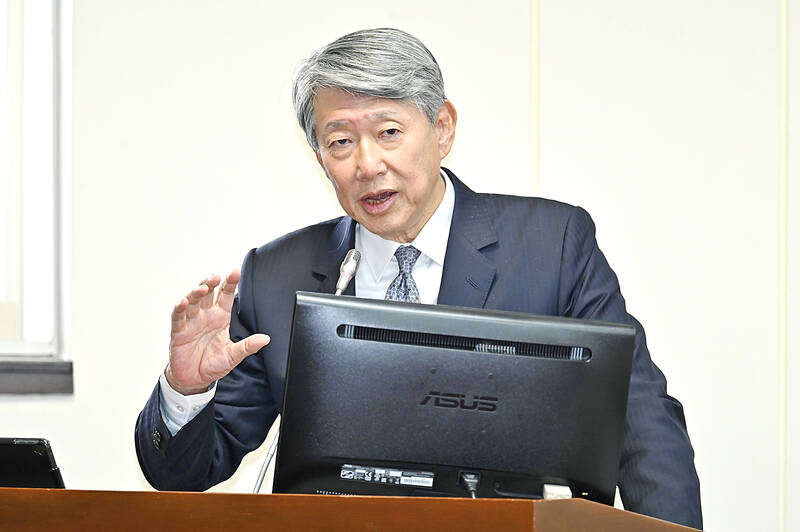Taiwan’s technology protection rules prohibits Taiwan Semiconductor Manufacturing Co (TSMC, 台積電) from producing 2-nanometer chips abroad, so the company must keep its most cutting-edge technology at home, Minister of Economic Affairs J.W. Kuo (郭智輝) said yesterday.
Kuo made the remarks in response to concerns that TSMC might be forced to produce advanced 2-nanometer chips at its fabs in Arizona ahead of schedule after former US president Donald Trump was re-elected as the next US president on Tuesday.
“Since Taiwan has related regulations to protect its own technologies, TSMC cannot produce 2-nanometer chips overseas currently,” Kuo said at a meeting of the legislature’s Economics Committee in Taipei.

Photo: Tu Chien-jung, Taipei Times
“Although TSMC plans to make 2-nanometer chips [abroad] in the future, its core technology will stay in Taiwan,” Kuo added.
LAW
Taiwanese law limits domestic chipmakers to producing chips abroad that are at least one generation less advanced than their fabs at home. TSMC told investors in July its next-generation A-16 chip is to enter volume production in the second half of 2026, after ramping up production of 2-nanometer chips next year.
According to TSMC’s overseas manufacturing roadmap, the company plans to produce 2-nanometer or more advanced chips in the US by the end of this decade, when its second fab in Arizona — which would utilize its 3-nanometer and 2-nanometer process technologies — becomes operational in 2028.
The third fab in Arizona would produce chips using 2-nanometer or even more advanced process technology, the chipmaker said.
TSMC’s first Arizona fab is set to ramp up production of 4-nanometer chips next month.
BILATERAL TIES
Meanwhile, Taiwan Semiconductor Industry Association (TSIA) chairman Cliff Hou (侯永清) yesterday said that history has shown that the result of the US presidential election would not significantly affect the company’s decades-long partnership between Taiwan and the US.
Hou also serves as a senior vice president at TSMC.
“The bilateral relationship has not changed because of the political landscape changes in the US,” Hou said at a forum in Hsinchu.
“There could be some alterations in details regarding this partnership. We will look at it when everything is certain,” Hou added.
Asked about how the TSIA could help local semiconductor companies navigate the challenges of the potential 10 percent tariff hikes that Trump threatened during his election campaign, Hou said the association has not received any official notification yet.
However, Taiwan should pour more resources into advancing chip technology and expanding its supply chain expertise to maintain global leadership, he said.
“We should accelerate research and development to ensure our standing as an indispensable member of the global semiconductor supply chain,” Hou said. “We are also working with the government to see whether we can attract foreign partners to set up design and materials centers in Taiwan.”
The 27-year TSMC veteran added that Taiwan must also aim to develop more expertise in equipment and materials, areas that are dominated by foreign businesses.
Additional reporting by Bloomberg

South Korea’s equity benchmark yesterday crossed a new milestone just a month after surpassing the once-unthinkable 5,000 mark as surging global memory demand powers the country’s biggest chipmakers. The KOSPI advanced as much as 2.6 percent to a record 6,123, with Samsung Electronics Co and SK Hynix Inc each gaining more than 2 percent. With the benchmark now up 45 percent this year, South Korea’s stock market capitalization has also moved past France’s, following last month’s overtaking of Germany’s. Long overlooked by foreign funds, despite being undervalued, South Korean stocks have now emerged as clear winners in the global market. The so-called “artificial intelligence

‘SEISMIC SHIFT’: The researcher forecast there would be about 1.1 billion mobile shipments this year, down from 1.26 billion the prior year and erasing years of gains The global smartphone market is expected to contract 12.9 percent this year due to the unprecedented memorychip shortage, marking “a crisis like no other,” researcher International Data Corp (IDC) said. The new forecast, a dramatic revision down from earlier estimates, gives the latest accounting of the ongoing memory crunch that is affecting every corner of the electronics industry. The demand for advanced memory to power artificial intelligence (AI) tasks has drained global supply until well into next year and jeopardizes the business model of many smartphone makers. IDC forecast about 1.1 billion mobile shipments this year, down from 1.26 billion the prior

People stand in a Pokemon store in Tokyo on Thursday. One of the world highest-grossing franchises is celebrated its 30th anniversary yesterday.

Chinese artificial intelligence (AI) start-up DeepSeek’s (深度求索) latest AI model, set to be released as soon as next week, was trained on Nvidia Corp’s most advanced AI chip, the Blackwell, a senior official of US President Donald Trump’s administration said on Monday, in what could represent a violation of US export controls. The US believes DeepSeek will remove the technical indicators that might reveal its use of American AI chips, the official said, adding that the Blackwells are likely clustered at its data center in Inner Mongolia, an autonomous region of China. The person declined to say how the US government received